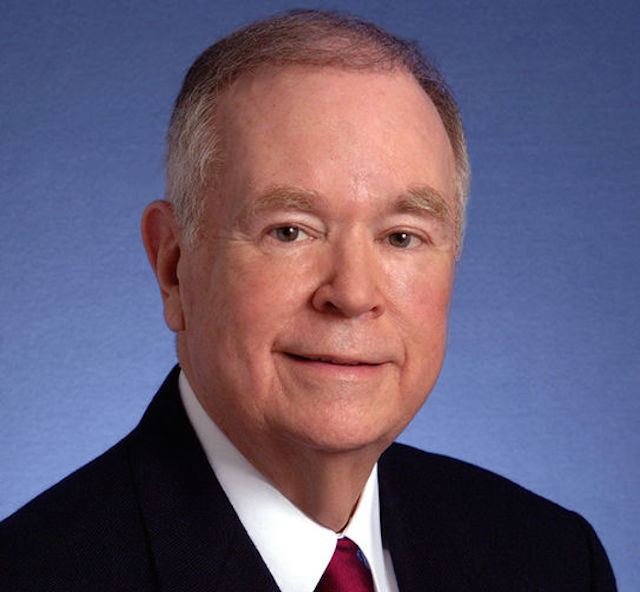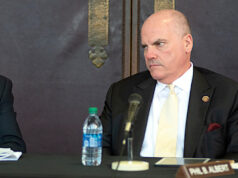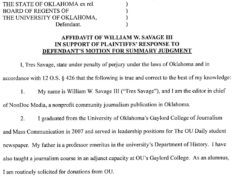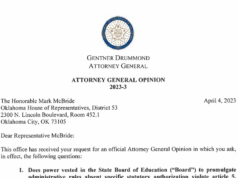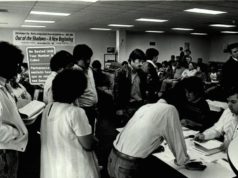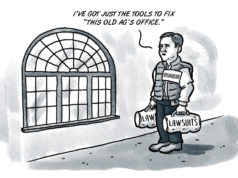
OU President David L. Boren is helping form a coalition of business and civic leaders that will push a statewide initiative petition to propose a $0.01 sales tax increase to voters.
The state revenue generated would specifically fund education.
Called “Oklahoma’s Children — Our Future,” the group is still seeking committee members, according to an e-mail from Boren obtained by NonDoc.
“It would raise approximately $615 million per year,” Boren’s e-mail said in estimation of a $0.01 statewide sales tax increase.
“$378 million would be used to fund an increase of approximately $5,000 per year in teacher salaries to make us competitive. None would go for administrative expenses. An additional fund of $50 million would be used for grants for locally controlled reforms like incentive pay, including possible incentives for STEM and reading programs and teachers or a slight increase in classroom teaching time per year. $125 million would go to higher education to keep down tuition and fees. $50 million would go for vital early childhood programs and $12.5 million for the vo-tech system.”
The e-mail was sent from Boren’s personal address, and in it he says he is “simply contacting you as a private citizen,” though some political figures are already skeptical of how the university president can make that claim.
NonDoc has learned that several high-profile Oklahomans have already committed to the coalition, though Boren himself said the group is still looking to identify a chairman or chairwoman to lead it. Boren emphasized he is not the chairman, though signs indicate he is very much spearheading organizing efforts.
“All of us need to be thinking about all the ways we can think of to get more money to all education — early childhood, public schools, universities,” Boren told NonDoc directly. “We’re all in a desperate situation.”
On Thursday, he released an official statement:
“Oklahoma faces an education crisis and it is appropriate that the people of Oklahoma have the opportunity to help address it. The fairest way to confront this crisis is to let all of our people decide on this important issue. We must find a way to help our children and grandchildren and create a brighter future for our state. I am eager to be a part of an announcement and launch that will include a bi-partisan and broad-based coalition of Oklahomans.”
Multiple people speaking on background have said the coalition already has bipartisan support, though it has its early detractors as well. A likely sign of Boren’s relative power and influence, NonDoc contacted numerous people within Oklahoma politics, but none wanted to speak on the record against the nascent proposal.
“We need to move very quickly to get the time for needed court approval to begin,” Boren said in his e-mail. “We must act within the next few days.”
One coalition member did release a statement Thursday in conjunction with Boren’s, and it hinted at a full announcement coming soon.
“I am excited to be a part of the steering committee and a formal announcement in the coming days,” 2016 Oklahoma Teacher of the Year Shawn Sheehan said in a statement released by the Gooden Group.
“With more than 1,000 teacher vacancies across the state, and a growing number of emergency certifications, we’ve reached a point where we can no longer wait to address this crisis facing our schools and our children. It breaks my heart to see so many of my fellow teachers leaving Oklahoma schools in droves to teach in bordering states.”
Legal requirements
Initiative petitions must have “ballot language” filed with the Oklahoma Secretary of State and the Oklahoma Attorney General. The petition can be protested by members of the public, but once all legal requirements are met, the Secretary of State sets a date for the circulation of signatures.
Petitioners have 90 days from that date to collect the required number of signatures. For an initiative petition not requiring constitutional change, petitioners must gather signatures totaling 8 percent of the number of votes cast in the last general election.
In this instance, 824,831 people voted for governor in 2014, so 65,987 signatures of registered Oklahoma voters would be required for any initiative petition circulated before November 2016. If Boren’s coalition chose to pursue a constitutional change — making it harder for future legislatures to repeal — the necessary signatures would climb to 123,725.
Boren has sternly expressed frustration with shrinking state appropriations for higher education before, and signs suggest he has been plotting how best to halt cuts to — and even increase — state education funding since personally buying full-page ads in the Tulsa World and The Oklahoman to lambaste a proposed state income tax cut in 2014.
Initiative petition workaround
Any type of bill raising revenue like this passed by the Legislature would likely also require a public vote, owing to statutes created by State Question 640 in 1992. That law now requires any revenue-increasing bill to receive supermajority support of three-fourths of both bodies of the Legislature, or be placed on the ballot for vote of the people.
The supermajority requirement has largely prevented state tax increases since its inception.
Sales tax burden
Oklahoma pulls a substantial amount of its revenue from sales taxes. For the 2014-2015 Fiscal Year, Oklahoma collected $9.78 billion in tax revenue.
Of that, $3.64 billion came from net income taxes, and $2.69 billion came from the state’s portion of sales and use taxes. City and county sales and use taxes — such as those raised in Oklahoma City for the MAPS initiatives — are not included in these numbers.
Calculations from TaxFoundation.org indicate that Oklahoma has the sixth-highest combined state and local sales tax rates in the United States. Comparatively, Oklahoma’s property tax revenues are much lower than many states.








